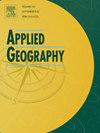对生态系统服务供需进行多尺度评估,以建立生态管理分区
IF 4
2区 地球科学
Q1 GEOGRAPHY
引用次数: 0
摘要
调查生态系统服务(ES)的供需匹配和规模效应有助于确定生态管理分区目标,并为政策和进一步研究提供信息。本研究构建了一个框架,以阐明生态系统服务供需匹配的 "静态-动态状态"。以中国太湖流域(TLB)为案例,我们重点研究了水-能源-粮食关系中的三种生态系统服务:水产量(WY)、碳封存(CS)和粮食供应(FP)。通过分析供需匹配的时空变化和规模效应,我们优化了生态管理分区。在 2000-2020 年期间,我们发现 CS 的供应和 WY 的需求都有所下降,但其他 ES 的供应和需求都有所增长。FP和CS的供需比下降,但WY的供需比上升。30 米网格尺度上的空间错配可能会在子流域和县尺度上消失。确定了四种生态管理束:城市束(占 TLB 的 18.20%)、生态控制束(26.62%)、综合生态保护束(20.31%)和 WY-FP 协同束(34.87%)。本研究通过整合静态和动态供求关系及其匹配状况来识别生态管理区的新理论和新方法具有广泛的适用性,为不同地理环境下的生态系统管理和政策制定提供了有价值的科学参考。本文章由计算机程序翻译,如有差异,请以英文原文为准。
Multi-scalar assessment of ecosystem-services supply and demand for establishing ecological management zoning
Investigating supply-demand matching and scale effects on ecosystem services (ESs) helps define ecological management zoning objectives and informs policy and further research. This study constructs a framework to clarify the “static-dynamic status” of ES supply-demand matching. With China's Taihu Lake Basin (TLB) as our case study, we focused on three ESs in the water–energy–food nexus: water yield (WY), carbon sequestration (CS), and food provision (FP). By analyzing spatiotemporal variations and scale effects on supply–demand matching, we optimized the ecological management zoning. Over 2000–2020, we found decreases in CS supply and WY demand, but growing supply and demand for the other ESs. The supply–demand ratio declined for FP and CS, but increased for WY. Spatial mismatch at 30 m grid scale may disappear at sub-watershed and county scales. Four ecological management bundles were identified: city bundle (18.20% of TLB), ecological control bundle (26.62%), integrated ecological conservation bundle (20.31%), and WY–FP synergy bundle (34.87%). New theories and methods developed in this study for identifying ecological management zones through integrating both static and dynamic supply and demand relationships along with their matching status are broadly applicable, providing a valuable scientific reference for ecosystem management and policy formulation in a range of geographical settings.
求助全文
通过发布文献求助,成功后即可免费获取论文全文。
去求助
来源期刊

Applied Geography
GEOGRAPHY-
CiteScore
8.00
自引率
2.00%
发文量
134
期刊介绍:
Applied Geography is a journal devoted to the publication of research which utilizes geographic approaches (human, physical, nature-society and GIScience) to resolve human problems that have a spatial dimension. These problems may be related to the assessment, management and allocation of the world physical and/or human resources. The underlying rationale of the journal is that only through a clear understanding of the relevant societal, physical, and coupled natural-humans systems can we resolve such problems. Papers are invited on any theme involving the application of geographical theory and methodology in the resolution of human problems.
 求助内容:
求助内容: 应助结果提醒方式:
应助结果提醒方式:


